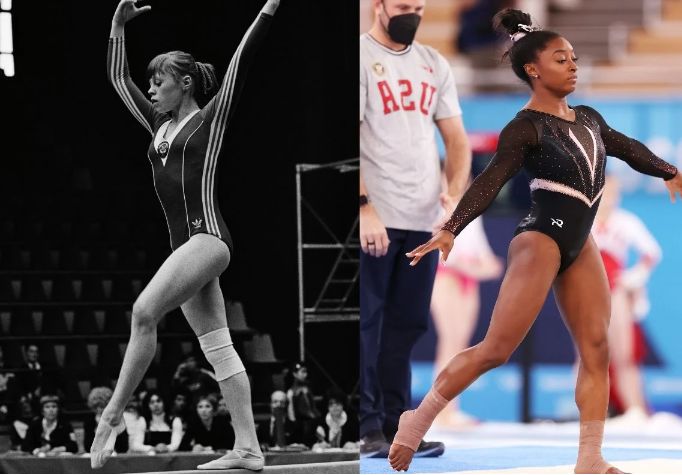
The tragic story of Elena Mukhina, the gymnast who wasn’t allowed to say ‘no’ like Simone Biles.
In 2024, six-time Olympic champion and golden girl of Team USA, Simone Biles, is a once-in-a-lifetime athlete. She’s the Michael Jordan of gymnastics. The Muhammad Ali. The Serena Williams. She is, undeniably, the greatest of all time.
Since 2013, the 27-year-old American gymnast has won six all-around titles. She has eight Olympic medals and 30 World Championship medals. She’s also the only woman who has performed the dangerous Yurchenko double pike in competition.
At the Olympic Games in Paris, Biles returned to the world stage and gave it everything — becoming the most decorated US Olympic gymnast in history. It’s the best comeback story of 2024.
But it’s almost impossible to look at this year’s success without acknowledging the unimaginable hardships Biles has faced in her career up to this point.
Most recently at the 2021 Tokyo Olympic Games.
Three years ago, in a move that shocked the world, Biles withdrew from the competition using one simple, yet powerful word: “No”.
It was in the Olympic women’s gymnastics team final, where thousands of people watched on as Biles lost her bearings in the middle of a vault, grimacing as she shakily landed on her feet.
She later reappeared on the sideline to support her fellow teammates, but not to compete. USA Gymnastics then released a statement confirming she had withdrawn with a “medical issue”.
Along with an outpouring of support for the athlete’s decision, at the time there was one question on everyone’s lips:
“Why did Simone Biles quit?”
While there was speculation as to whether Biles had obtained a physical injury, the athlete later shared that her decision was one that was based on mental health.
“Physically, I feel good, I’m in shape,” she told the US Today Show at the time. “Emotionally, that kind of varies on the time and moment. Coming to the Olympics and being head star isn’t an easy feat, so we’re just trying to take it one day at a time and we’ll see.”
In a post-finals press conference alongside her teammates, she said: “Whenever you get in a high-stress situation, you kind of freak out. I have to focus on my mental health and not jeopardise my health and well-being,” she said.
One person who wasn’t impressed by the headlines was controversial TV personality Piers Morgan, who called Biles’ decision to withdraw a “joke”.
In an article for Daily Mail, he urged Biles to “get back out there Simone, and don’t get sucked into all the weak woke failure-loving Twitter nonsense ― you’re too great a champion to be labelled a quitter.”
On Twitter, Morgan further trashed the mental health reasoning behind her departure.
“Are ‘mental health issues’ now the go-to excuse for any poor performance in elite sport? What a joke,” he wrote.
“Just admit you did badly, made mistakes, and will strive to do better next time. Kids need strong role models not this nonsense.”
The tweet sparked an insane backlash, with people slamming Morgan for his comments.
“We don’t need people like you making snide comments like this and adding to the stigma. You’re part of the problem,” one person wrote.
But Morgan hit back, tweeting: “Athletes are now deemed more courageous, inspiring and heroic if they lose or quit then if they win or tough it out, which is ridiculous.”
“I blame Twitter’s virtue-signallers for fuelling this culture of celebrating weakness. The real world doesn’t think like that.”
Other critics mocked Biles and compared her to Kerri Strug, who famously vaulted on an injured ankle for the United States at the 1996 Olympics, winning a gold medal. They suggested this was something that Biles should have done for her team — pushed through the pain.








